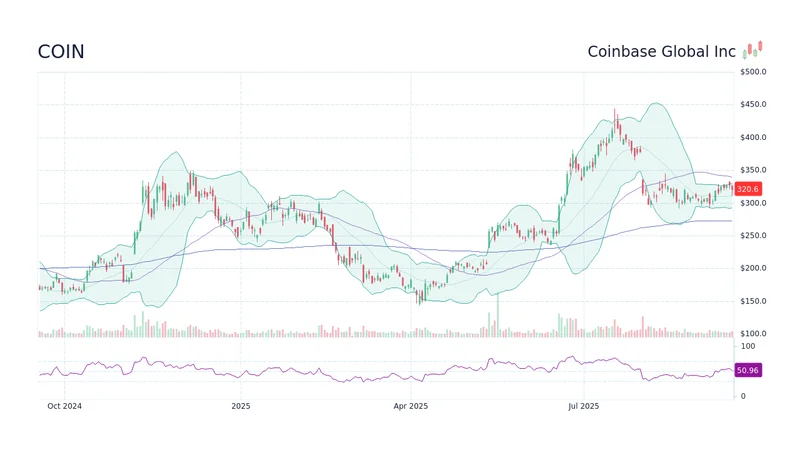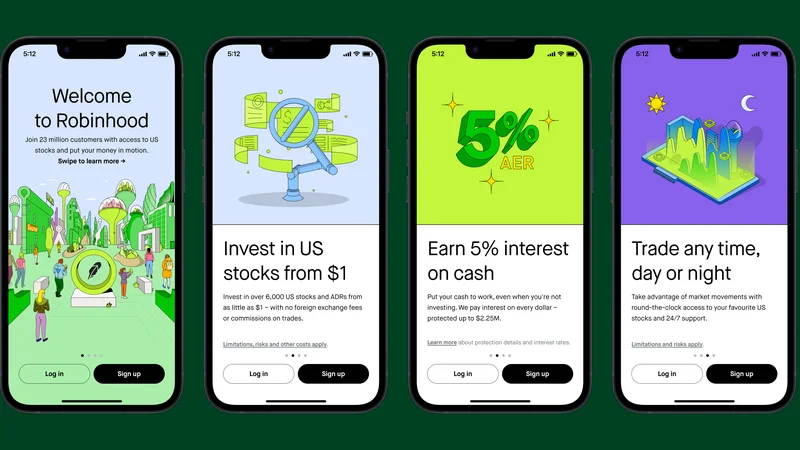Coinbase Stock's Rise: What It Reveals About the Future of Finance vs. Big Tech
We’ve all heard the tired old line: picking stocks is like a coin flip. A 50/50 shot in a casino where the house always wins. We’re told to diversify, to hedge, to play it safe, to accept the comfortable mediocrity of the average. And for years, I believed it. It’s logical, it’s prudent, and it’s what the data seems to suggest at first glance.
But what if that entire framework is wrong? What if we’ve been looking at the stock market through the wrong end of the telescope?
Recent analysis has brought a staggering truth into focus, a truth that reframes the entire purpose of public markets. According to S&P Dow Jones Indices, just 19% of stocks in the S&P 500 actually managed to outperform the average stock’s return over the last two decades. In many years, the number that beat the index was less than a third. The odds are, in fact, worse than a coin flip. But this isn’t a story of failure. When I first saw the data, I honestly just sat back in my chair, speechless. This is the story of a hidden genius embedded in the system.
The data shows that stock market returns are “positively skewed”—in simpler terms, it means that while most stocks are just okay, a tiny handful of superstars like `Nvidia stock` or `Tesla stock` hit home runs so massive they lift the entire average for everyone else. Think about that. The median return for an S&P 500 stock since 2001 was about 59%. The average return? A mind-bending 452%. This isn’t a bug; it’s the market’s most profound feature. It’s a system designed not to find the average, but to seek out and pour capital into the extraordinary.
The Market's Hidden Genius
This isn't just a statistical quirk. It's a fundamental law of progress, and it’s the kind of breakthrough in understanding that reminds me why I got into this field in the first place. The market is like a vast, distributed intelligence network constantly scanning the horizon for the next big thing. It’s not trying to make every company a modest success. It’s trying to find the one company in a thousand that will invent the next internet, the next form of energy, the next leap in human potential.
The work of professor Hendrik Bessembinder is the definitive statement on this. His research found that from 1990 to 2020, the top-performing 2.4% of global firms accounted for all of the net wealth creation. All of it. The other 97.6% were, in aggregate, a wash.
This is a power-law distribution, a signature of complex systems found everywhere in nature, from the size of earthquakes to the brightness of stars. And it tells us something beautiful about our own economic ecosystem. The `stock market` isn't a gambling parlor. It’s a discovery engine. It’s our civilization's primary tool for placing bets on the future, and it is brutally, wonderfully efficient at finding the ideas that will actually build it. So, does this mean we should all quit our day jobs and become stock pickers? Of course not. But it does mean we need to change the questions we ask. What if we stopped asking, “How can I beat the market?” and started asking, “How can I be a part of funding the breakthroughs that will define the next century?”

This system is our modern-day equivalent of the printing press. For every Bible or Copernican model that changed the world, thousands of forgotten pamphlets and screeds were printed. The press didn't care about the average quality of a document; its power was in its ability to find and amplify the revolutionary ideas. Our market does the same thing with capital.
From Weeds to World-Changers
Warren Buffett, a man who is more philosopher than investor, has understood this for decades. "Our satisfactory results have been the product of about a dozen truly good decisions," he wrote. He calls it a process of letting the "flowers bloom" while the "weeds wither away in significance." He’s not betting on averages. He’s searching for those dozen flowers.
And we can see this search playing out in real-time right now. Look at a company like Coinbase. The day-to-day `coin stock price` is a whirlwind of noise—regulatory chatter from the SEC, price swings in `bitcoin`, political winds. But zoom out. What is the real bet here? It's not just on a company. It's a bet on a potential paradigm shift in the very architecture of finance.
When I see Coinbase’s chief policy officer, Faryar Shirzad, talking about building a proper regulatory structure—prompting headlines like Coinbase Stock (NASDAQ:COIN) Jumps as Senior Staff Talks Regulations—I don't just see lobbying. I see the messy, necessary process of integrating a radical new technology into the mainstream. And when I read about a nonprofit like GiveDirectly running a universal basic income pilot in New York by sending USDC stablecoin directly to people's Coinbase accounts—it’s just a stunning glimpse of a completely different future, a future where value can be transferred almost frictionlessly and programmed with new rules. This is the kind of experiment that could either wither into a weed or bloom into a world-changing flower.
Of course, this concentration of power and wealth into a few "winners" brings with it an immense ethical responsibility. If only a tiny fraction of companies generate all the value, what does that mean for the rest of society? How do we ensure the fruits of these technological leaps are shared broadly? These aren't easy questions, but they are the right ones to be asking. The UBI experiment, powered by the very technology that represents this new frontier, is a fascinating, if nascent, attempt to start answering them.
The whole dynamic is breathtaking—it means the gap between an idea and a globally scaled reality is closing faster than we can even comprehend and the market is the engine driving it all. It’s a system that ruthlessly ignores the mundane to find the magical.
The Blueprint for Tomorrow
So, let's discard the old "coin flip" analogy. It’s not only wrong, it’s profoundly uninspiring. The market isn’t a game of chance. It is a powerful, emergent system for identifying and funding the future. It’s designed to find the 2% of ideas that will generate 100% of our progress. Your participation, whether through a broad index fund or a belief in a specific visionary company, isn’t just an investment. It’s a vote. It’s a small piece of capital allocated toward a vision of tomorrow. And in a world of accelerating change, placing a bet on human ingenuity isn’t just a good strategy—it’s the only one that matters.
-

Warren Buffett's OXY Stock Play: The Latest Drama, Buffett's Angle, and Why You Shouldn't Believe the Hype
Solet'sgetthisstraight.Occide...
-

The Great Up-Leveling: What's Happening Now and How We Step Up
Haveyoueverfeltlikeyou'redri...
-

The Future of Auto Parts: How to Find Any Part Instantly and What Comes Next
Walkintoany`autoparts`store—a...
-

Applied Digital (APLD) Stock: Analyzing the Surge, Analyst Targets, and Its Real Valuation
AppliedDigital'sParabolicRise:...
-

Analyzing Robinhood: What the New Gold Card Means for its 2025 Stock Price
Robinhood's$123BillionBet:IsT...
- Search
- Recently Published
-
- DeFi Token Performance & Investor Trends Post-October Crash: what they won't tell you about investors and the bleak 2025 ahead
- Render: What it *really* is, the tech-bro hype, and that token's dubious 'value'
- APLD Stock: What's *Actually* Fueling This "Big Move"?
- Avici: The Real Meaning, Those Songs, and the 'Hell' We Ignore
- Uber Ride Demand: Cost Analysis vs. Thanksgiving Deals
- Stock Market Rollercoaster: AI Fears vs. Rate Hike Panic
- Bitcoin: The Price, The Spin, & My Take
- Asia: Its Regions, Countries, & Why Your Mental Map is Wrong
- Retirement Age: A Paradigm Shift for Your Future
- Starknet: What it is, its tokenomics, and current valuation
- Tag list
-
- Blockchain (11)
- Decentralization (5)
- Smart Contracts (4)
- Cryptocurrency (26)
- DeFi (5)
- Bitcoin (31)
- Trump (5)
- Ethereum (8)
- Pudgy Penguins (6)
- NFT (5)
- Solana (5)
- cryptocurrency (6)
- bitcoin (7)
- Plasma (5)
- Zcash (12)
- Aster (10)
- nbis stock (5)
- iren stock (5)
- crypto (7)
- ZKsync (5)
- irs stimulus checks 2025 (6)
- pi (6)
- hims stock (4)
- kimberly clark (5)
- uae (5)
